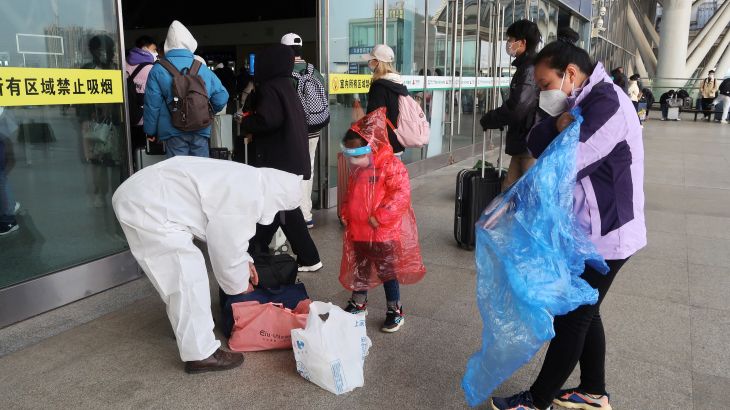China government health adviser warns of surging COVID cases
Fears of a spike in infections after Beijing eased its ‘zero-COVID’ restrictions following rare nationwide protests.

China faces a surge in COVID-19 cases after partially easing aspects of its so-called “zero-COVID” policy, a top government health adviser has said.
The warning from top epidemiologist Zhong Nanshan in an interview with state media on Sunday comes as official case numbers have dropped in China, a phenomenon largely attributed to a dramatic falloff in testing due to the policy about-face announced last week.
Keep reading
list of 3 itemsChina’s trade plunges to lowest level since 2020 amid COVID curbs
China loosens COVID quarantine, testing rules nationwide
The government made the changes – minimising the scope of mandatory testing, allowing some people who test positive to quarantine at home and ending large-scale lockdowns – following rare nationwide protests over the years-long restrictions.
“The [current] Omicron mutation … is very contagious … one person can transmit [the virus] to 22 people,” said Zhong, who has advised Beijing throughout the pandemic.
“Currently, the epidemic in China is … spreading rapidly, and under such circumstances, no matter how strong the prevention and control is, it will be difficult to completely cut off the transmission chain,” he said.
Across the country, urban areas showed signs of a population either afraid of a coming surge or already grappling with infections, with Zhong saying there were signs “that hundreds of thousands or tens of thousands of people are infected in several major cities”.
In Beijing, where officials reported only 1,661 new cases on Saturday, down from 3,974 on December 6, markets and malls remained largely empty, with several businesses closed.
“I’m afraid to step out,” Liu Cheng, a mother of two young children living in central Beijing’s Jianguomen area, told the AFP news agency.
“Many of my friends with COVID symptoms have tested positive when self-testing, but they haven’t reported this to the authorities or gone to the hospital.”
The expected surge has stoked concerns the country’s health system is ill-equipped to deal with a large population of unvaccinated older residents. The government has upped a vaccination campaign aimed at the elderly, but it is expected to take months to complete.
On Friday, Jiao Yahui, the director of the Department of Medical Affairs at the National Health Commission, warned the country has one intensive care unit bed for 10,000 people.
She said 106,000 doctors and 177,700 nurses would be redirected to intensive care units to cope with a spike in coronavirus patients, but did not offer details on how this would affect the health system’s ability to treat other diseases.
Jiao’s announcement came a day after a cabinet statement called for “full mobilisation” of hospitals, including adding staff to ensure their “combat effectiveness” and increasing drug supplies, according to state media.
The cabinet also called on officials to make sure rural areas have “fair access” to treatment and drugs to counter the current uneven distribution of hospitals and services.
Meanwhile, there were long queues outside pharmacies in Beijing on Sunday as residents rushed to stockpile cold and fever medicines and antigen test kits.
Some residents told AFP they were ordering drugs from pharmacies in nearby cities.
Protests calling for the easing of restrictions erupted following a deadly fire in Urumqi in the country’s northwest, with some questioning if anti-virus restrictions, including locked doors, made the incident worse, something authorities have denied.
The government of President Xi Jinping has promised to reduce the cost and disruption to the economy caused by the measures. The economy shrunk by 2.6 percent from the previous quarter in the three months ending in June.